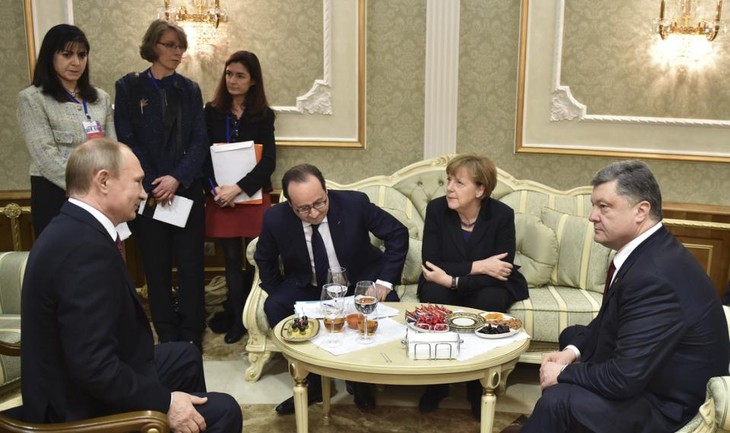(VOVworld) - Leaders of France, Germany, Russia, and Ukraine gathered on Wednesday in Minsk, Belarus for talks on ending the conflict in eastern Ukraine. There has been no final word yet on the second day of their negotiations, but analysts have said the outcome may fall short of expectations and it could take a long of time to reach a solution that will end the fighting.
 |
| Left to right, Russian President Vladimir Putin, French President Francois Hollande, German Chancellor Angela Merkel, and Ukrainian President Petro Poroshenko talk in Minsk, Belarus, Wednesday, Feb. 11, 2015. (AP Photo/ Mykola Lazarenko, Pool) |
The 4-way talks took place after a meeting of Foreign Ministers and representatives of the Contact Group. More than 500 reporters have been waiting outside the closed-door meeting.
Differences in resolving conflicts
Division among world powers over the Ukraine crisis has been worsening. Last week the US said it is considering providing Kiev anti-tank missiles, anti-mortar radar, and other devices. Several countries have voiced their objection to the US’s intention to provide military aid. Russia said if the US supplies weapons to Ukraine, Russia will supply weapons to the separatists and will retaliate on other “fronts” outside Ukraine, such as selling sensitive military technologies to China. Under UN sanctions, Russia cannot officially sell or transfer weapons technology to Iran. But the US’s escalating pressure could induce Russia to try to break the UN sanctions.
Germany and France have opposed the US supplying weapons supply to Ukraine, saying it will only prolong the fighting and undermine regional security. At the recent Munich Security Conference in Germany, Berlin and Paris sent clear messages that providing weapons to Kiev would go against their peace mission.
Will a document be signed or not?
The world is waiting to see a ceasefire document signed, a demilitarized zone established, heavy weapons pulled back, and regulations established for the rebel-controlled areas of Donestk and Lugansk, while maintaining Ukraine’s territorial integrity. Any new peace plan must be specific and binding.
The current tensions largely hinge on President Obama’s decision to provide weapons to Ukraine or not. Obama is under intense pressure from the US Congress to act decisively.
Another difficult issue is regulations for Ukraine’s separatist-held eastern regions. The Minsk agreement signed last September advocated a national dialogue and decentralization. The separatists rejected the recommendations and held parliamentary and presidential elections last November, before asking to be annexed to Russia. Russia rejected that request, but wants the separatists to permanently secure the land they have occupied rather than returning it to Kiev’s control.
Prior to the Ukraine peace talks, the US supported France and Germany’s initiative but expressed skepticism that Russia would abide by a peace agreement.
There has been no comprehensive solution to the Ukraine conflict, the worst in the West since the Cold War. The peace talks are widely viewed as the last hope of ending the violence in eastern Ukraine.